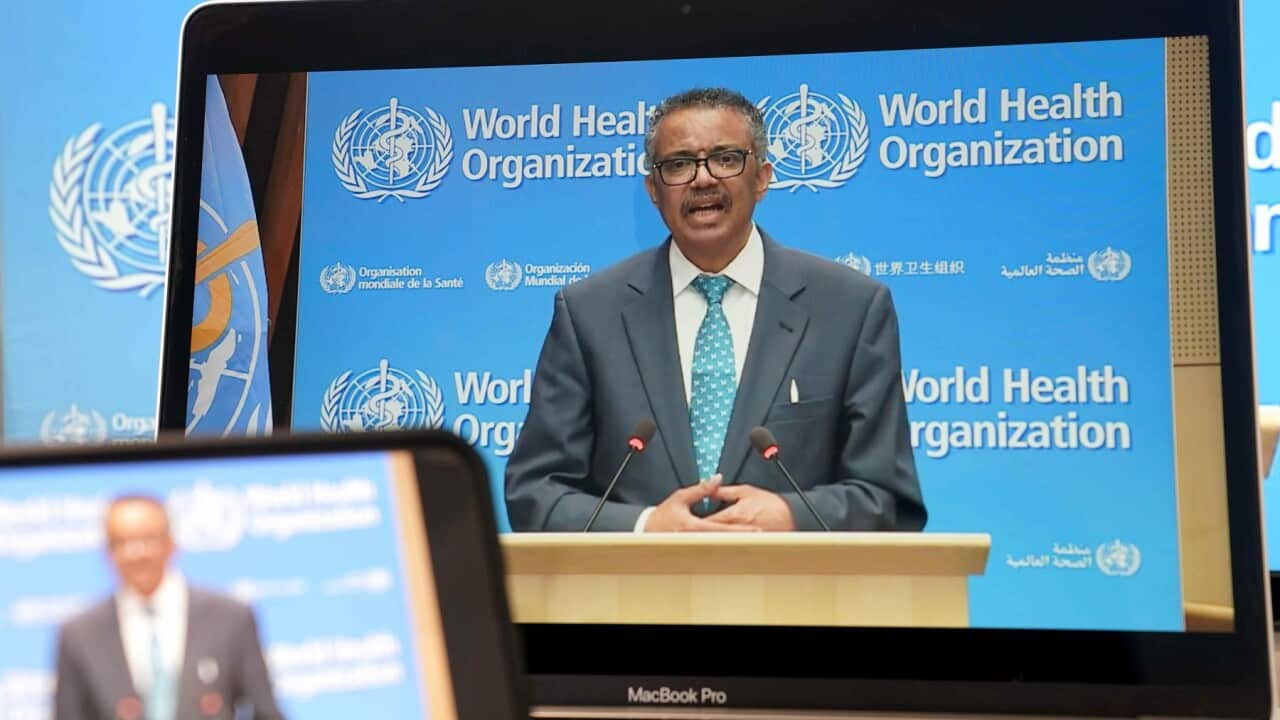The WHO recorded 106,000 new cases of COVID-19 infection worldwide in the last 24 hours - the most in a single day yet.
"We still have a long way to go in this pandemic," WHO director-general Tedros Adhanom Ghebreyesus said.
"We are very concerned about rising cases in low and middle income countries."
Mike Ryan, head of WHO's emergencies programme, said: "We will soon reach the tragic milestone of 5 million cases".
Many countries around the world are loosening their coronavirus restrictions but people are discovering that what a return to normal looks like varies widely.
In Spain, it's a new government order to wear masks outside even as some businesses reopen.
In Italy, where good food is an essential part of life, once-packed restaurants and cafes are facing a huge financial hit as they reopen with strict social distancing rules after a 10-week shutdown.
Experts warn that as many as one-third of the country's restaurants and bars could go out of business, up to 300,000 jobs in the sector could vanish and losses could reach $49 billion this year. The head of the Dutch hospitality industry welcomed a decision to allow bars and restaurants to reopen on June 1 but warned about the impact of mandatory social distancing rules.
The head of the Dutch hospitality industry welcomed a decision to allow bars and restaurants to reopen on June 1 but warned about the impact of mandatory social distancing rules.

People at a restaurant in Milan (AAP) Source: ANSA
"The restrictions are unfortunately unworkable" for many businesses, Rober Willemsen of Royal Hospitality Netherlands said, adding that more government support is needed to ensure the survival of many bars and restaurants.
Education, in many places, is facing radical changes.
Cambridge became the first university in Britain to cancel all face-to-face lectures for the upcoming school year, saying they will be held virtually and streamed online until the summer of 2021.
In the US, the University of Notre Dame in Indiana will bring students back to campus but redesigned its calendar to start the semester early in August and end before Thanksgiving, along with ordering masks, testing and contact tracing. In South Korea, hundreds of thousands of high school seniors had their temperatures checked and used hand sanitisers as they returned yesterday, many for the first time since late last year. Students and teachers were required to wear masks and some schools installed plastic partitions around desks.
In South Korea, hundreds of thousands of high school seniors had their temperatures checked and used hand sanitisers as they returned yesterday, many for the first time since late last year. Students and teachers were required to wear masks and some schools installed plastic partitions around desks.

University in the US will look very different to this 2012 photo from the University of Central Florida (AAP) Source: Orlando Sentinel/TNS/Sipa USA
France is limiting spaces in its primary schools, giving priority to the children of essential workers and those in need. Some younger students even go on alternating days while high schools remain closed.
While infection rates have been falling in Asia and much of Europe, the pandemic is still spiking in Latin America.
Brazil this week became the world's third worst-hit country with more than 250,000 confirmed cases despite limited testing.
In Lima, the capital of Peru, coronavirus patients are filling up the city's intensive care beds.
More than 4.9 million people worldwide have been confirmed infected by the virus, and more than 320,000 deaths have been recorded, according to a tally by Johns Hopkins University.
Russia and Brazil are now behind only the United States in the number of reported infections, and cases are also spiking in India, South Africa and Mexico.
People in Australia must stay at least 1.5 metres away from others. Check your state’s restrictions on gathering limits.
Testing for coronavirus is now widely available across Australia. If you are experiencing cold or flu symptoms, arrange a test by calling your doctor or contact the Coronavirus Health Information Hotline on 1800 020 080.
The federal government's coronavirus tracing app COVIDSafe is available for download from your phone's app store.
SBS is committed to informing Australia’s diverse communities about the latest COVID-19 developments. News and information is available in 63 languages at .


